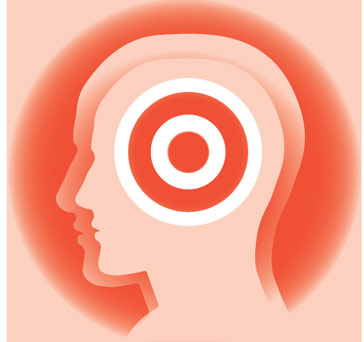Most people who sustain a first-time concussion may experience symptoms—dizziness, nausea, headaches, anxiety and forgetfulness, among others—for about a week following the injury. When symptoms continue for a longer period of time, a thorough neurological assessment is needed.
“Little is known about how the brain is injured following a concussion, so we focus on treating symptoms,” says David Brody, MD, PhD, a Washington University neurologist at Barnes-Jewish Hospital. “For some patients, we may recommend they abstain from work, school or athletic activities for a period of time. We also may recommend restricting computer use and other activities that require intense concentration. For other patients, we may prescribe medications that help relieve or prevent headaches, promote sleep or ease depression. Symptoms for every concussion are different, so our treatment plans need to be highly individualized.”
 Brody and his colleague Maurizio Corbetta, MD, also a Washington University neurologist and the head of neurorehabilitation at Barnes-Jewish, treat patients with concussion at the hospital’s Concussion Clinic. The clinic’s multidisciplinary team works together to help each patient make a complete and quick recovery by providing a rapid assessment and treatment approach similar to that used by the United States military.
Brody and his colleague Maurizio Corbetta, MD, also a Washington University neurologist and the head of neurorehabilitation at Barnes-Jewish, treat patients with concussion at the hospital’s Concussion Clinic. The clinic’s multidisciplinary team works together to help each patient make a complete and quick recovery by providing a rapid assessment and treatment approach similar to that used by the United States military.
“Prior to establishing our clinic, I traveled to Afghanistan to see how the military helped soldiers recover from concussions sustained in combat situations,” says Brody. “From that research and our own years of experience with these injuries, we developed a protocol that offers the most up-to-date, comprehensive approach for assessing and treating concussion symptoms.”
“Our team includes neurologists, rehabilitation physicians, physical therapists and neuropsychologists who work to identify a patient’s symptoms and develop an individualized approach to treatment,” says Corbetta. Patients referred to the clinic are seen by a physician for a thorough examination and medical history. If appropriate, they then undergo a series of tests that assess cognitive function, balance and exercise tolerance. Once the evaluations are complete, the physician shares the findings with patients and recommends a treatment plan.
Adds Corbetta, “Often, part of the treatment is simply reassuring a patient that symptoms will improve over time as the brain heals.”